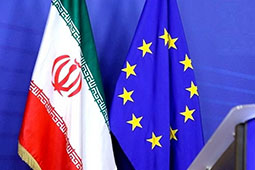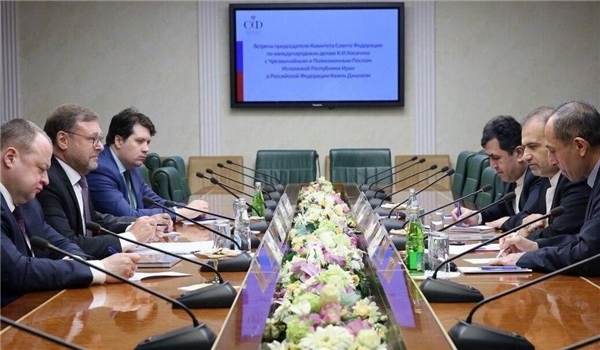
Envoy Slams Impracticality of European Financial Channel

In a meeting with Chairman of the Foreign Affairs Committee of the Russian Federation Council Konstantin Kosachev on Tuesday, Jalali said that Europeans created the INSTEX, a financial channel devised to bypass US’ unilateral sanctions against Tehran, but no transaction have ever been made via the system.
Referring to high status of parliamentary relations between the two countries, he said that bilateral ties should further improve in various fields including economy and trade.
Jalali called on the two countries' private sectors to introduce their capabilities and potentials to one another.
Kosachev, for his part, highlighted significance of parliamentary relations between Tehran and Moscow and expressed satisfaction over the two countries' parliamentarians' support to each other's initiatives in the international organizations including Shanghai Cooperation Council.
Welcoming development of Iran's economic relations with Eurasia, he hoped that Iran and Russia's parliamentary relations would further improve.
During the meeting, both sides discussed bilateral relations, regional issues, fighting terrorism and extremism as well as the 2015 nuclear deal, officially known as the Joint Comprehensive Plan of Action (JCPOA).
In November, Iranian Deputy Foreign Minister Abbas Araqchi lashed out at Europe for offering a late solution of no practical use for circumventing the US unilateral sanctions against Tehran, regretting that Europe's trade mechanism has not been fully operationalized.
"This financial system has been suggested too late and [it] operates at a low level. It has not been yet fully implemented," Araqchi said in an interview with Russia's Sputnik, referring to the INSTEX.
The three European signatories to the JCPOA unveiled late in January 2019 the long-awaited direct non-dollar payment mechanism meant to safeguard their trade ties with Tehran following the US withdrawal from the nuclear deal and in the face of the "toughest ever" sanctions imposed by the United States against the Islamic Republic.
In its initial stage, INSTEX was supposed to facilitate trade of humanitarian goods such as medicine, food and medical devices, and later be expanded to cover other areas of trade, including Iran’s oil sales. However, it has not resulted in any trade deals so far.
"If not, there will be not a large amount of money left for trade in accordance with this tool," Araqchi added.
Russian Foreign Minister Sergei Lavrov said a week before Araqchi’s remarks that the INSTEX mechanism still remained on paper.
Late in July, Iranian Foreign Minister Mohammad Javad Zarif had underlined that that Europeans should dare to act based on their commitments not based on US orders.
The INSTEX has been a preliminary step which has so far failed to go operational, Zarif told reporters after a cabinet meeting in Tehran.
He added that even if it becomes operational, it should handle oil revenues as well, he added.
It is clear that that the INSTEX will not work with the US agreement, Zarif said, adding that INSTEX should be considered an action taken by the Europeans.



Trump weighs using $2 billion in CHIPS Act funding for critical minerals

Codelco cuts 2025 copper forecast after El Teniente mine collapse

Electra converts debt, launches $30M raise to jumpstart stalled cobalt refinery

Barrick’s Reko Diq in line for $410M ADB backing

Abcourt readies Sleeping Giant mill to pour first gold since 2014

Nevada army depot to serve as base for first US strategic minerals stockpile

SQM boosts lithium supply plans as prices flick higher

Viridis unveils 200Mt initial reserve for Brazil rare earth project

Tailings could meet much of US critical mineral demand – study

Kyrgyzstan kicks off underground gold mining at Kumtor

Kyrgyzstan kicks off underground gold mining at Kumtor

KoBold Metals granted lithium exploration rights in Congo

Freeport Indonesia to wrap up Gresik plant repairs by early September

Energy Fuels soars on Vulcan Elements partnership

Northern Dynasty sticks to proposal in battle to lift Pebble mine veto

Giustra-backed mining firm teams up with informal miners in Colombia

Critical Metals signs agreement to supply rare earth to US government-funded facility

China extends rare earth controls to imported material

Galan Lithium proceeds with $13M financing for Argentina project

Kyrgyzstan kicks off underground gold mining at Kumtor

Freeport Indonesia to wrap up Gresik plant repairs by early September

Energy Fuels soars on Vulcan Elements partnership

Northern Dynasty sticks to proposal in battle to lift Pebble mine veto

Giustra-backed mining firm teams up with informal miners in Colombia

Critical Metals signs agreement to supply rare earth to US government-funded facility

China extends rare earth controls to imported material

Galan Lithium proceeds with $13M financing for Argentina project

Silver price touches $39 as market weighs rate cut outlook

















